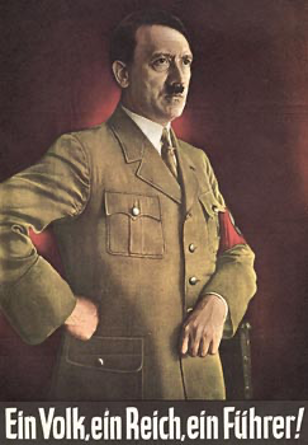B. Germany, 1918–45
 As you will have seen from your study of peacekeeping after the First World War, Germany had emerged from the war in a state of economic and political chaos; it had also had to accept responsibility for the war and face a range of punishing measures imposed by the Allies.
As you will have seen from your study of peacekeeping after the First World War, Germany had emerged from the war in a state of economic and political chaos; it had also had to accept responsibility for the war and face a range of punishing measures imposed by the Allies.
The new Weimar government attempted to deal with the problems created by the war but, having achieved some success in regaining stability in the 1920 was devastated by the impact of the Great Depression.
It was this situation which allowed Adolf Hitler and the Nazis to emerge as the most powerful group in Germany and to establish a dictatorship. This dictatorship would have a profound impact on not just the people of Germany, but also the rest of Europe. Hitler's actions on the international stage led Europe into another war in 1939 - a way which would result in the deaths of millions of people.
Left wing and right wing: Left wing refers to those wanting social and political change as opposed to right wing people who want to maintain the existing situation. The term comes from the French Revolution in the Estates General; those sitting on the left of the King wanted radical change and those who supported the King and status quo sat on the right of the King.
Socialist republic: this is a system of government without a monarchy that aims to bring in social and economic changes such as welfare improvements and nationalization of industry that would benefit everyone.
Soviet republic: this is a system of government without a monarchy that aims to introduce a communist state such as that established in Russia following the 1917 Revolution. It would be organized by workers’ councils and supported nationalization and workers’ control of major industries
Conservatism: this is linked to ‘right wing’: Conservatives tend not to like change and they tend to support the traditional aspects of society and forces of law and order
An authoritarian government: this is when there is an emphasis on strict obedience to the law at the expense of individual freedoms

